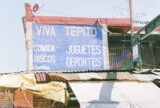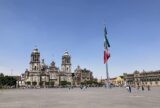Riding the Cablebús Over Mexico City
A New Gondola System Has Been a Game-Changer for Marginalized Neighborhoods. Will Tourism Ruin It?
I’ve lived in Iztapalapa—Mexico City’s most populous borough, with over 1.8 million inhabitants—for the last 26 years. The borough is considered part of the “periphery” of Mexico City, areas of the metropolis that are both politically and economically marginalized. It has a hilly, dense urban landscape that isn’t one of skyscrapers, but of unfinished, self-built homes. Most are gray, the color of the blocks they are made of; others have painted facades that are showing their wear. Inside, taps go months or years without running water, meaning that …










